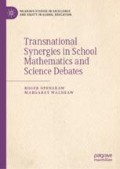Abstract
This chapter shifts the analysis to another radical programme that, according to its designers, would have the potential to transform students’ understandings of physics in each of the countries under study. As with the new mathematics, the United States based Physical Science Study Committee’s curricula (commonly known as P.S.S.C. Physics), had its origins in political, professional and public concerns with existing approaches to what was historically regarded as a challenging area of study for secondary school students. Once again, a concentration on the fundamental underlying structure of the discipline was to proceed hand-in-glove with fresh approaches to teaching the subject that would intimately involve students in attempting to solve some of the fundamental questions facing science and the nation.
Access this chapter
Tax calculation will be finalised at checkout
Purchases are for personal use only
References
Primary Sources
Archives New Zealand Files (Wellington)
Aitken, F. R. G. (1964). Letter to J.D. Herron, Principal, Bayside High School [18 June]. ABEP. W4262. Box 1833. 34/2/7. Mathematics Part 1. 1953–1969. Archives New Zealand, Wellington.
Beberman, M. (1960). Letter to F.R.G. Aitken, Office of Director of Education, Department of Education, Wellington [29 March]. ABEP. W4262. Box 1721. 34/2/7/1. Part 1. Core Maths–Illinois Maths, Archives New Zealand, Wellington.
Evans, E. W. (1959). Mathematics—Dead or Alive? [April]. ABEP. W4262. Box 1833. 34/2/7. Mathematics Part 1. 1953–1969. Archives New Zealand, Wellington.
Hawkhead, T. (1960). Letter to F.R.G. Aitken, Chief Inspector of Post-primary schools, Wellington [9 March]. ABEP. W4262. Box 1721. 34/2/7/1. Part 1. Core Maths–Illinois Maths, Archives New Zealand, Wellington, Archives New Zealand.
New Zealand Department of Education. (1960). Progress Report on Science and Mathematics in the United States [13 July]. In Education Overseas—Education System in United States of America, ABEP. Series 7749, Accession W4262, Box 654. Record 16/1/6. Part 1. Archives New Zealand, Wellington [R.7226417].
Phearman, L. T. (1960). Proposal for Sabbatical [Undated but c. January]. In Education Overseas—Education System in United States of America. ABEP. Series 7749. Accession W4262, Box 654. Record 16/1/6. Part 1. Archives New Zealand, Wellington [R.7226417].
Published Sources
Books
Barksdale Clowse, B. (1981). Brainpower for the cold war: The Sputnik crisis and National Defense Education Act of 1958. Westport, CT: Greenwood Press.
Evans Warmsley, A. L. (2003). A history of the “new mathematics” movement and its relationship with current mathematical reform. Latham and New York: University Press of America.
Haran, W. J. (1982). Admiral Hyman Rickover, USN: A decade of educational criticism, 1955–64 (Unpublished doctoral dissertation). Loyola University of Chicago.
Jackson, K. (Ed.). (1971). Fight for life. Wellington, New Zealand: Price Milburn for the New Zealand Institute of International Affairs.
Kania, R. P. (1953). Mathematical literature. A.M.A. Bulletin, V(1).
Moon, B. (1986). The ‘New Maths’ curriculum controversy: An international story. London: Falmer Press.
Report of the Committee appointed by the Minister of Education in November 1942 (1959 Reprint). The Post-primary school curriculum (The Thomas Report). Wellington: New Zealand Department of Education [December].
Rosenberg, W. (1962). What every New Zealanders should know about E.E.C. Christchurch: New Zealand Monthly Review Society Inc.
Newspaper
Oliver, F. (1958, April 8). Dr Gallup takes a poll. Assessment of U.S. education. Evening Post, Wellington.
Interview
Stokes, B. (1990). Interviewed by R. Openshaw. In R. Openshaw (Ed.) (1991). Schooling in the 40s and 50s: An oral history. Educational Research and Development Centre, Massey University, Palmerston North, pp. 96–103.
Author information
Authors and Affiliations
Corresponding author
Rights and permissions
Copyright information
© 2019 The Author(s)
About this chapter
Cite this chapter
Openshaw, R., Walshaw, M. (2019). The Ascent of the “New Maths,” 1957–1970. In: Transnational Synergies in School Mathematics and Science Debates . Palgrave Studies in Excellence and Equity in Global Education. Palgrave Macmillan, Cham. https://doi.org/10.1007/978-3-030-28269-1_5
Download citation
DOI: https://doi.org/10.1007/978-3-030-28269-1_5
Published:
Publisher Name: Palgrave Macmillan, Cham
Print ISBN: 978-3-030-28268-4
Online ISBN: 978-3-030-28269-1
eBook Packages: EducationEducation (R0)

